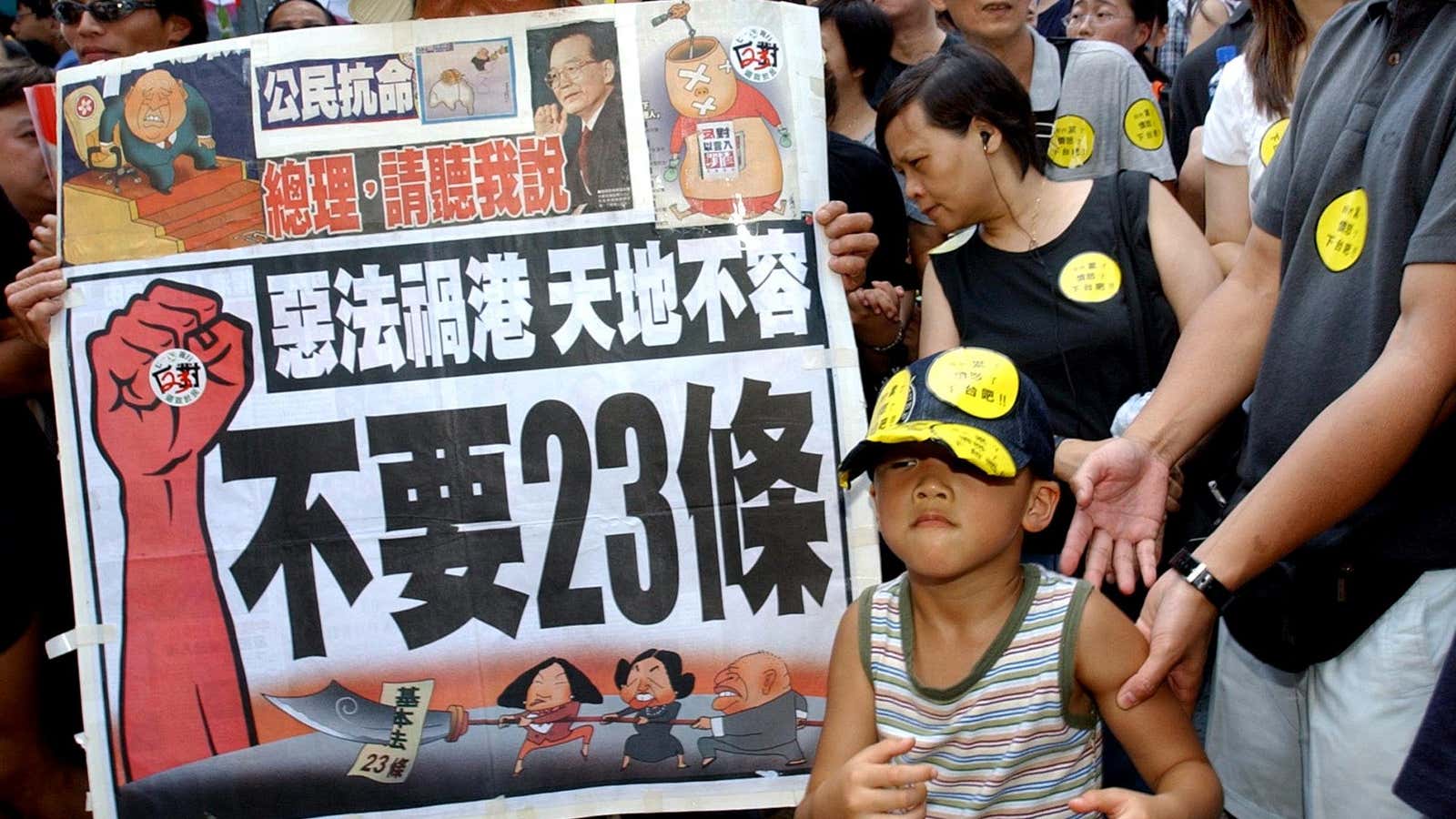Hong Kong’s chief executive Leung Chun-ying is pouring oil onto an already highly explosive political crisis in Hong Kong.
Beijing said today (Nov. 7) it would “interpret” the relevant clauses of Hong Kong’s mini constitution, the Basic Law, to effectively ban two pro-independence, democratically elected lawmakers, Yau Wai-ching and Baggio Leung, from swearing in to assume their roles. The decision, which was flagged last week, was preceded by violent clashes last night (Nov. 6) between protestors and police in Hong Kong.
Wasting no time, Leung, who is deeply unpopular, evoked the specter once again of the dreaded “Article 23” of the Basic Law on Monday, a proposed bill that has haunted Hong Kong citizens for nearly two decades. The vaguely worded provision has been robustly rejected by Hong Kongers in the past, over fears it could lead to draconian laws similar to those used in mainland China to crush dissent and imprison political activists.
Under the “One Country, Two Systems” framework, Hong Kong enjoys a much higher degree of free speech and political dissent than on the mainland or in neighboring Macau, another Special Administrative Region of China that already passed Article 23 in 2009.
On Monday, though, Leung hinted the time had come to revive that provision in the Basic Law, suggesting at a press conference the threat of Hong Kong independence now provides the perfect pretext. In response to a reporter’s question about the possibility of reviving Article 23, Leung said, “We have not seen anyone advocating independence in the past but now we see it. This indeed deserves our attention.”
The Hong Kong Special Administrative Region shall enact laws on its own to prohibit any act of treason, secession, sedition, subversion against the Central People’s Government, or theft of state secrets, to prohibit foreign political organizations or bodies from conducting political activities in the Region, and to prohibit political organizations or bodies of the Region from establishing ties with foreign political organizations or bodies.
The article’s very ambiguity is one of the reasons why Hong Kong people are deeply opposed to it. For example, as an international city, Hong Kong hosts foreign organizations of many stripes, from NGOs to countless international chambers of commerce and foreign recreation clubs—all of which are allowed to exist in China only on an informal basis, and could potentially be shut down at any moment.
Hong Kong has been under pressure to enact the relevant laws for Article 23 since its return to Chinese sovereignty in 1997, but a first attempt at introducing the bill was dropped in 2003 when some half a million people marched against it. Legislators then voted down the package. Regina Ip, now a pro-Beijing lawmaker, resigned from her post as Secretary for Security afterwards.
The article’s history adds to its sinister profile—it was squeezed into the Basic Law by China in 1989, with its language made stronger just days after more than a million people in Hong Kong took part in a demonstration against the violent crackdown in Tiananmen Square. That was the first time Hong Kong had marched for democracy in such numbers, despite a violent typhoon shaking the city, and it sowed even deeper seeds of mistrust between the citizenry and its soon-to-be new sovereign.
That mistrust has escalated since the 2014 Umbrella Movement protests. Yau and Leung’s oath-taking saga could may be the perfect excuse for Beijing to finally implement Article 23, which requires a vote in the legislature. On top of that, the race to be Hong Kong’s next chief executive in 2017 has already begun. Leung’s hardline could bode well for his re-election chances in the eyes of Beijing, who is determined to stamp out any further talk of independence in Hong Kong.
